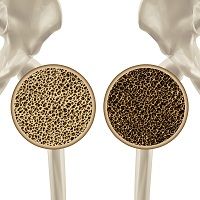Article
Bone Mineral Density and Antidepressants Linked in Men
Author(s):
Recurrent major depressive disorder episodes are linked to lower bone density in men, according to findings published in the Journal of Musculoskeletal and Neuronal Interactions.

Recurrent major depressive disorder episodes are linked to lower bone density in men, according to findings published in the Journal of Musculoskeletal and Neuronal Interactions.
Researchers from the University of Eastern Finland observed nearly 1,000 men between 2006 and 2011 in order to investigate the relationship between depression and the use of antidepressants with bone mineral density. The men were aged 24 to 98 years and were recruited from the Geelong Osteoporosis Study. The participants completed a questionnaire, while researchers gathered clinical measurements and bone mineral density data from the forearm, spine, total hip, and total body.
Less than 10 percent of the men (84 participants) had a single major depressive disorder episode, the researchers found. An additional 50 men had recurrent episodes and 65 participants were using antidepressants at the time of the study. The investigators determined that recurrent episodes of major depressive disorder were linked to lower bone mineral density in the forearm (-6.5 percent less) and total body (-2.5 percent less) compared to men without a history of major depressive disorder episodes. Additionally, single major depressive disorder episodes were linked to higher bone mineral density at the total hip measurement by 3.4 percent, compared to men with no history of major depressive disorder episodes.
Using antidepressants, the researchers concluded, was linked to lower bone mineral density in men with a lower weight only and varied across bone density measurement sites. The researchers cited the example of men weighing less than 110 kg (about 240 lbs). In that population, the researchers found reduced bone mineral density. Another example demonstrated the link between antidepressants and reduced bone mineral density in the forearm of men who weigh less than 75 kg (about 165 lbs).
The researchers commented that depression and the use of antidepressants have been linked to loss of bone mineral density, but typically in studies of postmenopausal women. These studies indicate that in postmenopausal women, the risk for osteoporosis greatly increases. Other risk factors include low levels of physical activity, smoking, low calcium and/ or vitamin D intake, alongside other medications and diseases, a press release noted. In elderly populations, the statement continued, susceptibility to fracture and serious hip fractures stemming from osteoporosis can result in long term hospitalization and decreased overall health.
The authors believe, and other studies suggest, that depression is associated with lower bone density — possibly due to the effects of depression induced chronic stress and/ or increased secretion of inflammatory markers. Depression medication has also demonstrated effects on weakening bone health. However, again, the majority of these types of studies have focused on postmenopausal female populations.




